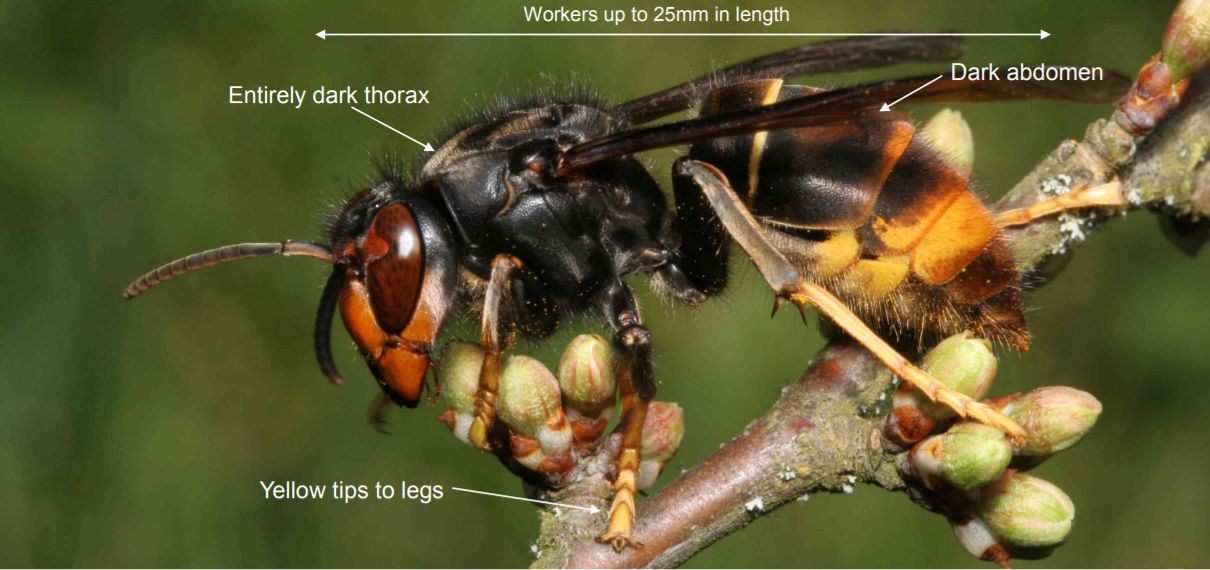|
People in Somerset are urged to join the fight to save honeybees and other pollinators and take part in the UK's first Asian hornet week on September 10-16.
Somerset Beekeepers’ Association Chairman Anne Pike said: “We need beekeepers, gardeners, walkers and everyone in Somerset to be on the lookout for this highly destructive insect. “Asian hornets are wreaking havoc in France and the Channel Islands and we fear that if they get a foot-hold in the UK, our honeybees and many other insects will be decimated here, too. This week is timed to coincide with the last chance this year to prevent the emergence of new Asian hornet queens.” Lynne Ingram, a Master Beekeeper from East Huntspill, has spent the last 10 days tracking Asian hornets in Jersey where, in the space of less than two years, they have spread across the island. “In Jersey it is proving very challenging to find all the nests as they are very well camouflaged. Thirty four nests have been found so far this year, but there is a constant stream of new sightings every day. The team are working flat out, but the sheer number of sightings is overwhelming, even with the assistance of UK beekeepers and a team from Exeter University. Whilst it had been believed that hornets nested high in trees, they have also been found in hedges and at ground level in a bramble patch. These low level nests are more of a public safety issue, especially as people tidy their gardens and cut their hedges at this time of year. “It is crucial that we are all vigilant – and that any nests are found. One missed nest means lots more next year. Many people enjoy working in their gardens, so are ideally placed to spot them. Asian hornets often collect nectar from ivy and autumn flowering camellias, where they will also hawk for bees and wasps, catching them in mid air. Asian hornets are easy to spot – they are large and appear mainly black in the air. When they land, the distinctive single orange stripe across the abdomen is very obvious. They are docile when on a flower – it is only when a nest is disturbed that they become aggressive. If you see one take a photo or vide, and report to the Non Native Species Secretariat.” The Asian hornet has a distinctive orange face and yellow tipped legs. Any sightings should be reported immediately, with a photo or video, to the Non-Native Species Secretariat (NNSS) [email protected] Ends Notes to editors: PHOTO CALL: YOU ARE INVITED TO VISIT ONE OF THE UK’S SENTINEL APIARIES WHICH MONITORS FOR ASIAN HORNETS FOR THE LAUNCH OF ASIAN HORNET WEEK (Sept 10-16). WHEN: MONDAY, SEPTEMBER 10 AT 11AM WHERE: TAUNTON BEEKEEPERS’ APIARY IS LOCATED AT HEATHERTON PARK NR BRADFORD ON TONE, TAUNTON TA4 1EU (LOCATED ON THE A38 BETWEEN TAUNTON AND WELLINGTON OPPOSITE THE WORLD’S END PUB) Somerset Beekeepers’ Association is made up of 12 divisions and works to advance the craft of apiculture within its membership and to promote general awareness and understanding of honeybees
Comments are closed.
|
Archives
September 2023
Categories
All
|
Somerset Beekeepers Association Charity © 2021 Registered CIO Charity 1206483
Affiliated to the British Beekeepers Association
Click here to view our Privacy Policy
Affiliated to the British Beekeepers Association
Click here to view our Privacy Policy

 RSS Feed
RSS Feed
